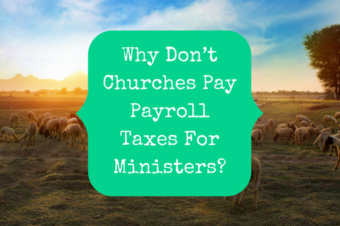
The Tax Cuts & Jobs Act introduced a 20% deduction for qualified small businesses. As a pastor, even if you don’t have a side business, you may still be able to take advantage of it.
I just spent an hour working on my taxes. It looks like this year I will have 12 different forms to file.
12!
That sure doesn’t seem simplified to me. The Tax Cuts & Jobs Act was supposed to simplify things, but I guess I’m just special. Lucky me.
One thing I am grateful for, though, is the new 20% qualified business income deduction. It does a little to counterbalance the 15.3% self-employment taxes I have to pay. While I receive the deduction because I am self-employed, some pastors will be able to do so even without a side business. How? And what is this deduction in the first place?
What Is The 20% Qualified Business Income Deduction?
The Tax Cuts & Jobs Act greatly reduced the corporate tax rate, bringing it lower than some individual rates. A lot of small businesses are not taxed at the business level, but rather all of their profits are taxed as income to the owner. This difference in tax rates gives preferential treatment to corporations over other kinds of businesses.
In order to rectify this, the tax reform bill introduced the qualified business income deduction, sometimes called the 199A deduction based on the part of the tax code where it is found. That way, small business owners will only have to pay the higher tax rate on 80% of their business income, lowering their effective tax rate.
Who Can Take The Qualified Business Income Deduction?
The deduction is for business income, so you have to file a Schedule C in order to claim it. There are also restrictions as to what kinds of businesses qualify, but only if your taxable income is over $157,500 for single filers or $315,000 for married couples. Most pastors make less than that, so you don’t have to worry about all the other restrictions.
But how does this apply to pastors? Even if you don’t have a side business, you may still be able to take advantage of this deduction. Have you ever received money for performing a wedding or funeral? Have you ever received an offering as a guest speaker at another church?
Those funds that you receive for doing pastoral things from others besides your church are supposed to be reported on Schedule C when you file taxes. If that’s news to you, you need to read this article about all the different ways the IRS treats a pastor’s income. (And if your tax preparer didn’t know, get a new one.)
If your church doesn’t give it to you, it’s considered self-employment income. Self-employment income is reported on Schedule C. Starting this year, you can deduct 20% of that income on Form 1040 when you file your taxes.
How Do You Take The Deduction?
So, let’s say you performed a couple of weddings and did a few outside speaking engagements in 2018 and were given $3,000 in exchange. You need to report that $3,000 on Schedule C.
Then, on Form 1040 line 9, right below where you choose either the standard or itemized deduction, you’ll be able to write in $600. There is a worksheet in the Form 1040 instructions, but you’ll likely end up with a straight 20%. Now your taxable income is $600 less, which means that you’ll owe less in taxes.
Pretty cool, huh?
Here are some other articles that might help you as you prepare your taxes this year:
The New 2018 Form 1040: How It Looks & What It Means For You
How The Final Tax Bill Affects Pastors
What To Do If Your 2018 Housing Allowance Exceeded Your Actual Expenses
Are Love Offerings Taxable Income?
All The Different Ways The IRS Treats A Pastor’s Income
Why Don’t Churches Pay Payroll Taxes For Ministers?




6 Responses
Darin Slaymaker
March 5, 2019I was told as a minister we can take advantage of a little tax break that is reserved for the business world an Accountable Plan. Do you have any insight on that..
Amy
March 6, 2019Darin,
Churches can set up Accountable Plans that follow specific IRS rules as a way to reimburse pastors and other workers for business expenses without having the reimbursement count as income. The church itself would have to set it up. That sounds like a good topic for a full blog post!
Amy
December 24, 2020https://pastorswallet.com/how-to-set-up-a-church-accountable-plan-to-reimburse-ministry-expenses/
Dave
March 8, 2024Helpful, Amy! Thank you.
Amy
March 15, 2024You’re welcome, Dave!